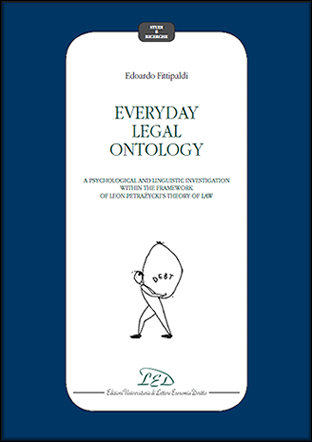|
EVERYDAY LEGAL ONTOLOGY A Psychological and Linguistic Investigation ISBN 978-88-7916-600-3 - 15,5 x 22 cm - 2012
pp. 302 – € 36,00
|
Everyday or naïve legal ontology is a branch of (general) naïve ontology. Naïve ontology is understood by the author as an empirical science dealing with the way naïve people conceive external reality – or, in the plural, realities. In this sense ontology can be viewed as a branch of psychology. In order to investigate how people conceive realities naïve ontology draws mainly on naïve language. The way we talk of realities is assumed to be indexical of the way we conceive them. Therefore naïve ontology, as a branch of psychology, is also closely related to cognitive linguistics. Addressing that special ontology that is naïve legal ontology – namely the way non-jurists conceive legal realities – presupposes a scientific (or, depending on the point of view, legal-metaphysical) theory as regards what legal phenomena really are. Only such a theory does make it possible to investigate the mismatches between the naïve legal conceptions and the scientific ones. As his theoretical frame Fittipaldi adopts Leon Petrażycki’s theory of law. Although Fittipaldi provides the reader with information about Petrażycki’s theory, the goal of this book is not to assess it, but rather to directly deal with the special challenges raised to it by naïve legal ontology. According to Petrażycki’s theory of law, legal phenomena are purely individual psychological experiences. External legal realities are therefore but illusions. Thus, naïve legal ontology is a challenge to legal solipsism as it raises the following question: if what we call ‘law’ is nothing else but the individuals’ legal- psychological experiences, why do individuals believe that there objectively exist legal realities, such as legal qualities and entities, independent of the subjects experiencing them? To answer this question Fittipaldi draws on general näive ontology as well as on the modern psychological theories concerning the development of the reality hypothesis and of such ethical emotions as shame, guilt, pride, anger and indignation. Among others the book contains a detailed discussion of modal verbs (considered by Fittipaldi as indexical of moral or legal qualities) and of the illusion of debts. Debts are viewed by Fittipaldi as the thickest näive legal illusion and a detailed analysis of the terms for this illusion in several languages is also provided. Edoardo Fittipaldi (Milano, 1973) teaches (with Paolo di Lucia) Law and Ontology at the State University of Milan as well as Sociology of Cultural Consumption at the University of Pavia. He has also been teaching General Jurisprudence at the University of Camerino. He is author of Scienza del diritto e razionalismo critico. Il programma epistemologico di Hans Albert per la scienza e la sociologia del diritto (Giuffrè, 2003) and of Psicologia giuridica e realismo. Leon Petrażycki (Led, 2012).
Il
testo è di 302 pagine ed è contenuto in un unico file PDF |
|


